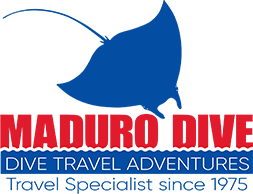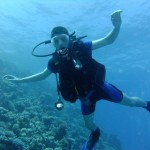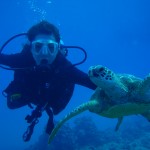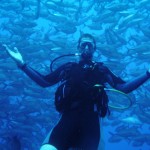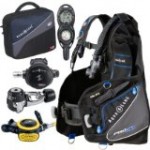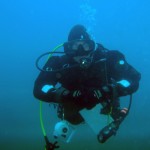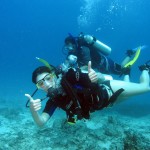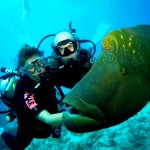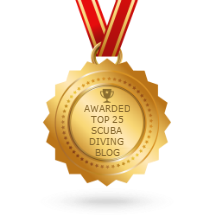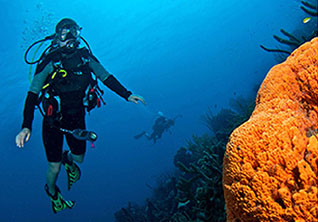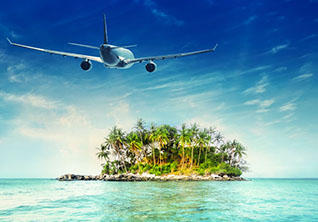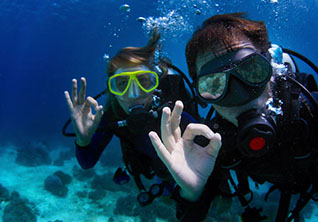Anxiously Awaiting Your Next Dive?
If you dive less than 7 to 14 times a year you might want to take a refresher course before you go on your next big vacation or scuba dive adventure. You have either read something like this in your introductory scuba course, a dive magazine, or heard it down at a local dive shop. The reason is simple, if you practice diving on a regular basis, you become more familiar with more facets of your dive gear and scuba diving conditions in general. Being comfortable with your dive gear and the local dive conditions is the goal of every diver as it reduces anxiety and enhances your over all dive experience, but besides the basics, what else can you do to ensure the a perfect dive the next time out? Perhaps we should talk about dive gear first.
Even if you are diving warm waters, we recommend wearing a full rash guard or preferably a 3ml wetsuit that covers your torso, arms, and legs. Sure on the first dive you are warm in just a swimsuit, but after several dives and several days, you may start to feel cold before the end of the dive, and the urge to find a bathroom will eventually override your desire to maximize your bottom time. Acting on this urge before surfacing only exacerbates the situation by briefly heating your outer extremities then cooling them down while your blood vessels have become dilated by the sudden warmth which makes your heat loss increase exponentially. A wetsuit or rash guard is also a good way to protect your body from fire corals, jelly fish, and even prevents you from getting sunburned shoulders and legs when you are diving less than 20ft below the surface or doing decompression stops. A hood, bandana, cap or scap also works as the ultimate sun blocker for your head, especially if your hair is short or you’re like some of us and folically challenged.
Having your own gear with you on a trip always reduces anxiety because your familiar with how it operates and comfortable with how it fits , but sometimes renting gear is the best option, especially when it comes to the airlines baggage policies and added cost. We always recommend taking your own mask, booties, dive computer as there is nothing worse than a leaky mask and a limited or unfamiliar computer. Fins could be added to the essentials list if based on previous rentals that with every kick it reminded you of the movie Foot Loose. As for the rest of your rental gear, be sure and do an easy shallow shore dive to make sure you are absolutely comfortable with how the unfamiliar gear operates, sits, and fits. Now if you dive with steel tanks and you find yourself using rental aluminum tanks while on vacation, you’ll need to add some additional weight too. You’ll notice the difference aluminum tanks make at the end of the dive when aluminum tanks down around 500psi try to make you float to the surface if you didn’t plan a head and weight yourself properly for this contingency.
Everyone talks about how important buoyancy is and we recommend on working on perfect buoyancy so you can glide down underwater and surface later on as soft and slow as a snowflake or leaf swept along in a gentle breeze, but what if your next dive adventure calls for diving down quickly to get below the swift currents near the surface? You might need a little more weight, and little more practice to control a little quicker descent. Also, the added weight will affect how much air and at what rate you need to expel air from your BC on your ascent back to the surface too. Practicing with a few extra pounds of weight will lessen your overall anxiety when it comes to diving in areas where currents are typically stronger.
Task overloading is a common phenomena that can lead to symptoms of high anxiety. If you have been out of the water for awhile, chances are diving a deep night drift wreck dive from a boat while navigating using dive lights and taking video/pictures while lobster hunting is going to feel like a multitasking nightmare. Perhaps a better option is to strap a Gopro or Intova video camera in place so you are hands free, and for all the types of diving you plan on doing, perhaps training in each of these fields separately and in advance would not only prepare you for your next dives, but would also put you in the water more frequently. Skills in boat diving, deep diving, drift diving, night diving, and navigation to name a few, could be used at almost any resort or dive site worldwide. When your trained properly, it is easier to anticipate your needs, plan your dive, and actually dive your plan from Belize, Cozumel, Bonaire, Palau, Truk, or Papua New Guinea. Also, good dive operators are there to help you. Don’t hesitate to communicate any concerns you may have. Even the most experienced divers have encountered feelings of unease and apprehension. Voicing any worries along with all of this training with your gear and dive conditions increases your safety, knowledge, and your confidence and ability to make the best decisions when it counts most, and thus makes every dive more pleasurable and relatively anxiety free.
